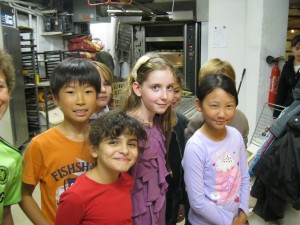What Gerard Depardieu and I Don’t Have in Common. Or, The Immigration Blues.
After threatening to become a Belgian citizen to avoid paying 75 percent of his income in taxes (based on a controversial proposal by the new French president, Francois Hollande), Gerard Depardieu has taken the next step into absurdity by trading his French passport for a Russian one. Yesterday’s Le Monde showed the French actor dressed in traditional Russian folk garb, being offered his choice of an apartment or a lot on which to build a house, in a part of Russia more known for prison camps than tourist attractions.
Getting French immigration papers is not nearly as easy. Since the day I arrived, four months ago, I’ve been trying to get my carte de sejour (roughly the equivalent of an American green card).
All the stories I’d heard hadn’t prepared me. The offices of immigration are scattered all over the city, so people seem to have different experiences, depending on where they are assigned. Ours was near the Bastille, one of the world’s most famous prisons. Not a good omen.
I’d heard about people being rounded up like cattle, men and women together, shirtless and braless, while being given medical exams en masse. But that’s not how it happened with us. If I’ve learned anything about the experience, it’s that it seems to be varied and almost random. Our friends who lived in this apartment last year didn’t receive their cartes until after seven months. Among foreigners at our daughter’s school, one family received a twelve-month visa before they even arrived, one had to return to the U.S. during the November school vacation to do paperwork at the Embassy, one received a five-year visa immediately, and another, staying only a semester, received their cartes the day before they returned to the U.S. I think the idea is to catch us by surprise.
Which is what happened. After standing in line with hundreds of people, my husband James and I were handed tickets and told to separate. My first thought was: Men in one hall, women in another. I was expecting to be asked to strip, after all. But that wasn’t the case. I figured maybe they just separated husbands and wives to make it more stressful. A woman at a desk took all my paperwork and said I needed to wait for my name to be called. Much later, a technician took an x-ray of my chest and told me to wait again. A doctor then did a superficial exam, saying, “You’re American. You must have all your vaccinations.” (So much for the letter that told me I was required to bring in my lifetime vaccination records.) Finally, I was ready to stand in another line, at the police prefecture down the hall. My letter had said I would be required to take a French test, but it must have been wrong. I was going to get my card!
It seemed too good to be true, and it was. An angry woman in a red turtleneck sweater told me to get out of line. Apparently, my husband’s and my tickets had been switched, and he had gone to the hall for spouses and I to the hall for “scientists.” He had been shown a film and given a lecture about assimilating into French culture, which was meant for me. I had been whisked through the system relatively painlessly, which was meant for him. It was not our mistake, but the woman, a social worker, I later learned, was upset with us, anyway. Luckily, though, she did not make us leave and reschedule for another day. Who knows when that other day might have been, since it had taken us four months to get this appointment?
I’m sorry I missed the film. James said he was impressed by its message: “You are French now, and this is how we do things. Here, husbands are not allowed to forbid their wives from working. The governmenet will help you find a job and improve your French. Husbands are not allowed to beat their wives. Women have the same rights as men.” The walls were covered with signs explaining the dangers of female genital mutiliation and encouraging people to get an AIDS test and avoid carbon monoxide poisoning.
I was required to do an interview with a social worker, something my husband, as a “scientist,” was exempt from. She asked about my education and job experience, my career aspirations and child care availability. She complimented my French, effusively. (So much for having to take a French test.) She wasn’t angry anymore, but warm and friendly.
Finally, my husband and I reconnected and stood in line at the police prefecture again. The office consisted of a man in blue jeans and a woman in a tight dress and heels, who both alternated eating chocolates, checking e-mail on cell phones, and licking fiscal stamps, while occasionally looking up to tell a woman that just because she had a crying baby didn’t mean she could cut the line.
We handed in our stamps, worth hundreds of Euros, and watched the bureaucrats lick and stick them onto forms, a frighteningly low-tech procedure that made me feel as if we’d gone back in time fifty years. Nothing was computerized. Finally, I heard the dreaded words: They’d lost my file. They would call all the other immigration offices in Paris and try to track it down. I could wait, but there was only a half hour before the office closed, and it was the last Friday before Christmas, so my chances were slim.
I already had a ticket for a trip to the United States in early January. Without a carte de sejour, since my three-month visa had already expired, I would not be allowed to return to France. I was trapped.
I tried to lose myself by reading Billy Lynn’s Long Halftime Walk, substituting a story about American absurdity for my real-life experience of French craziness. Finally, the chocolate-eating woman called my name. She found my file. I got my card.
It is a beautiful thing, worth every minute of anguish. I still don’t understand my ordeal, but I’m trying to tell myself: “I am French now, and this is how we do things.”
I’ll celebrate with a bottle of champagne (because that is definitely the way we do things.) Maybe I’ll also watch a classic Gerard Depardieu film. Not his best (Last Metro in Paris) or even most recent (Asterix and Obelisk). But Green Card.



